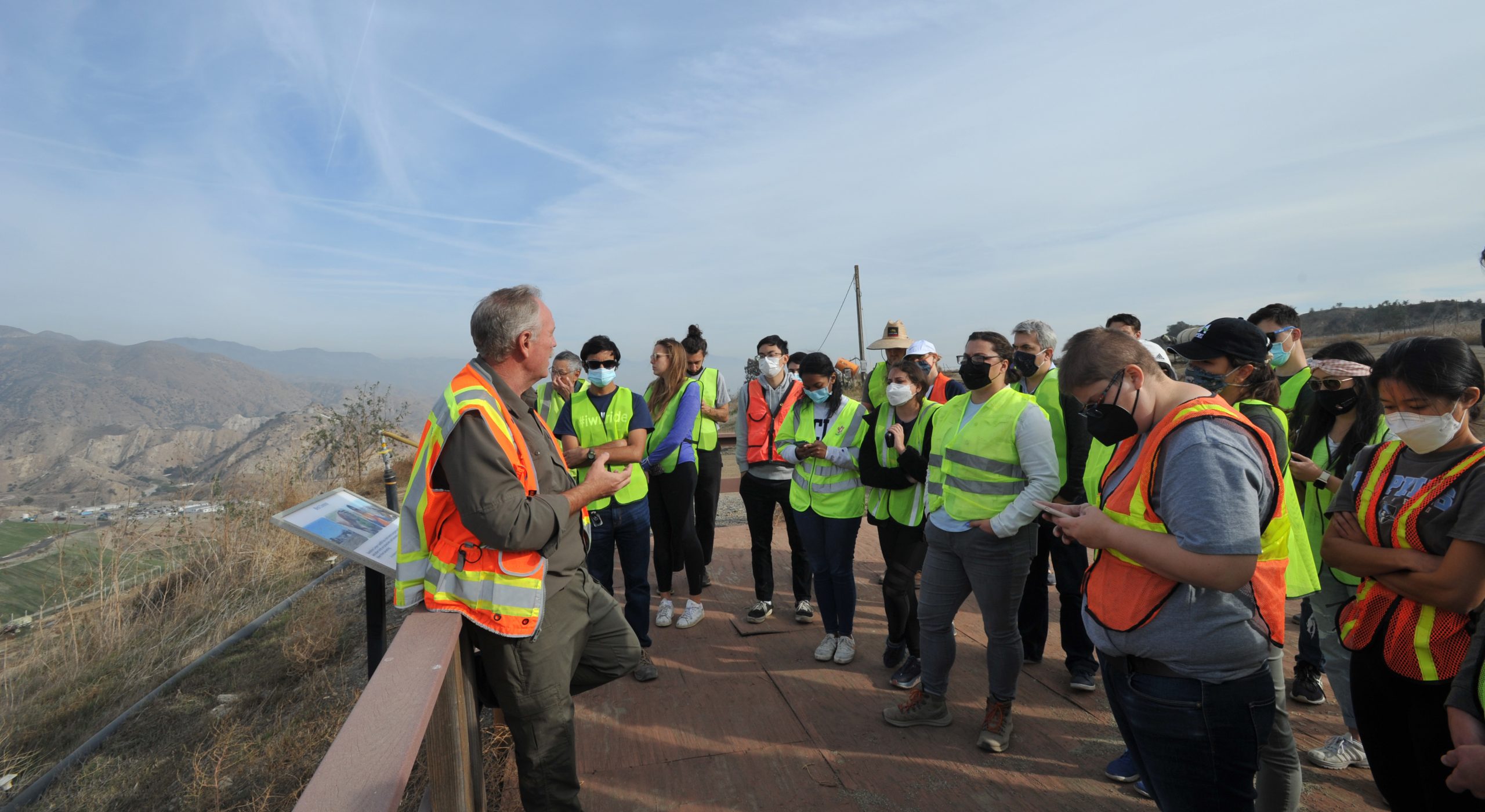Workers and Technology Together (WATT)
Lead Researchers
- Dr. Bingbing Li, Manufacturing Systems Engineering*
- Dr. Nhut Ho, Mechanical Engineering*
- Eugene Tseng, Environmental Law and Environmental Engineering*
- Silvia Carpitella, Asst. Professor, Engineering Management*
- Farshad Ghodoosi – Business Law
- Joe Bautista – Associate Director and Professor of Art + Design
Collaborators
- Los Angeles Local Enforcement Agency*
- Waste Management*
- Tahoe Truckee Sierra Disposal (TTSD)*
- Anaergia
Student Team
- Monitha Davuluri, M.S. Computer Science*
- Eric Liu, Ph.D. Mechanical Engineering*
- Faria Binta Taher, M.S. Manufacturing Systems Engineering*
- Lucas Liu, B.S Computer Science*
- Cesar Aranibar Paredes, M.S. Manufacturing Systems Engineering*
- Ruchit Rajubhai Radadiya, M.S. Manufacturing Systems Engineering*
- Mitesh Sawant, Manufacturing Systems Engineering and Management
- Douglas Cruz, Business and Economics
- David Bell, Manufacturing Systems Engineering and Management
- Melissa Baghoumian, Business and Economics
- Jianhao Zhu, Manufacturing Systems Engineering and Management
- Joshua Vazquez, Communication Design
- Nitya Kumari, Business Administration
- Fahima Arif, Electrical engineering
- Keiana Samoy, Business Analytics
Funding
- Funding Organization: National Science Foundation
- Funding Program: Future Work – Human-Technology Frontier
Note: names marked with an asterisk (*) indicate current team
SYNOPSIS
- Workers and Technology Together (WATT) aims to provide socio- technological solutions to address the challenges with separation, conversion to energy, adaptation of best practices, and climate change analyses in the context of organic waste processing.
- The project will help determine if applying autonomy technologies to key organic waste processing functions will increase the capture of organic waste, reduce hazardous job functions for line workers and enforcement agents, and increase efficiency and profitability of organic waste processing.
- The students will leverage multi-sensor data fusion to develop highly intelligent AI model for waste sorting and management.
Abstract
The Autonomy Research Center for STEAHM (ARCS) at California State University, Northridge (CSUN), proposes to conduct convergence research into the potential for autonomy
technologies to improve the efficiency and productivity of the organic waste processing industry and the safety and security of those who work in the industry. The FW-HTF-P: Workers and Technology Together (WATT) project team, consisting of ARCS faculty from legal, business, computer science, art/design, mechanical engineering, anthropology, sociology, psychology, and manufacturing systems engineering disciplines, along with ARCS graduate research Fellows and undergraduate Associates, will team with experts in environmental regulations, advanced concepts, and an organic waste processing facility partner to use a convergence research approach to identify socio-technological innovations that will address the challenges with separation, conversion to energy, legal frameworks, adaptation of best practices, and climate change analyses in the context of organic waste processing. Through its research, the project team will determine if applying autonomy technologies to some key organic waste processing functions will increase the capture of organic waste, reduce hazardous job functions for line workers and enforcement agents, increase the efficiency and profitability of organic waste processing, and up/reskill low-skill, temporary workers to assume full-time, semi-skilled positions working alongside automation assistants.
How can we apply autonomy technologies to some organic waste processing functions to increase the capture of organic waste, reduce hazardous job functions for line workers and enforcement agents, increase the efficiency and profitability of organic waste processing, and up/reskill low-skill, temporary workers?
Lead Researchers
- Nhut Ho – ARCS Director – Mechanical Engineering
- Bingbing Li – Manufacturing Systems Engineering & Management
- Farshad Ghodoosi – Business Law
- Joe Bautista – Associate Director and Professor of Art + Design
Collaborators
- Los Angeles Local Enforcement Agency, Waste Management, Anaergia
Student Team
- Mitesh Sawant, Manufacturing Systems Engineering and Management
- Douglas Cruz, Business and Economics
- David Bell, Manufacturing Systems Engineering and Management
- Melissa Baghoumian, Business and Economics
- Jianhao Zhu, Manufacturing Systems Engineering and Management
- Joshua Vazquez, Communication Design
- Nitya Kumari, Business Administration
- Fahima Arif, Electrical engineering
- Keiana Samoy, Business Analytics
Funding
- Funding Organization: National Science Foundation
- Funding Program: Future Work – Human-Technology Frontier


Research Questions and Objectives
-
WATT will facilitate convergence research, employing multidisciplinary perspectives to better understand the “pain points” for individual workers, owner/operators, enforcement agents, and across the organic waste processing infrastructure.
-
From this research, the project team will develop frameworks — legal & business, sociological/anthropological/psychological, computer science/engineering/robotics — to produce a concept of operations for implementing automation technologies into the processing of organic waste.
Research Methods
Based on the analyzed pain points, the project team will develop frameworks (sociological/anthropological/psychological/design, legal & business, computer science/engineering/robotics) to produce a concept of operations (ConOp) for implementing automation technologies into the processing of organic waste, and ensuring workers are trained to work alongside and in collaboration with assistive technology.
Research Deliverables and Products
-
Develop a highly intelligent AI model that can integrate multimodal data (captured by optical, thermal, IR, acoustic, density, and chemical sensors), digital twin, robotics, AI reasoning, and machine learning to harness, interpret, predict, and guide the optimization of the operation and behavior and safety of material recovery facility workers.
-
Build and validate AVATAR technology (AI-powered Vision and Augmented reality for Teleoperation Assisted Recycling) by adapting the scientific methods of computer vision, AI, and inference engines to provide intuitive and personalized assistance to workers performing complex reasoning and problem-solving tasks.
Commercialization Opportunities
-
Application: Develop an AI model to help workers, owners, and operators leverage cutting-edge waste management technology
-
Key Values: Improve the operational efficiency and working conditions in waste processing facilities
-
Potential Customers: Material recovery facilities
Research Timeline
Start Date: September 2021
End Date:
Lead Researchers
- Dr. Bingbing Li, Manufacturing Systems Engineering*
- Dr. Nhut Ho, Mechanical Engineering*
- Eugene Tseng, Environmental Law and Environmental Engineering*
- Silvia Carpitella, Asst. Professor, Engineering Management*
- Farshad Ghodoosi – Business Law
- Joe Bautista – Associate Director and Professor of Art + Design
Collaborators
- Los Angeles Local Enforcement Agency*
- Waste Management*
- Tahoe Truckee Sierra Disposal (TTSD)*
- Anaergia
Student Team
- Monitha Davuluri, M.S. Computer Science*
- Eric Liu, Ph.D. Mechanical Engineering*
- Faria Binta Taher, M.S. Manufacturing Systems Engineering*
- Lucas Liu, B.S Computer Science*
- Cesar Aranibar Paredes, M.S. Manufacturing Systems Engineering*
- Ruchit Rajubhai Radadiya, M.S. Manufacturing Systems Engineering*
- Mitesh Sawant, Manufacturing Systems Engineering and Management
- Douglas Cruz, Business and Economics
- David Bell, Manufacturing Systems Engineering and Management
- Melissa Baghoumian, Business and Economics
- Jianhao Zhu, Manufacturing Systems Engineering and Management
- Joshua Vazquez, Communication Design
- Nitya Kumari, Business Administration
- Fahima Arif, Electrical engineering
- Keiana Samoy, Business Analytics
Funding
- Funding Organization: National Science Foundation
- Funding Program: Future Work – Human-Technology Frontier
Note: names marked with an asterisk (*) indicate current team
